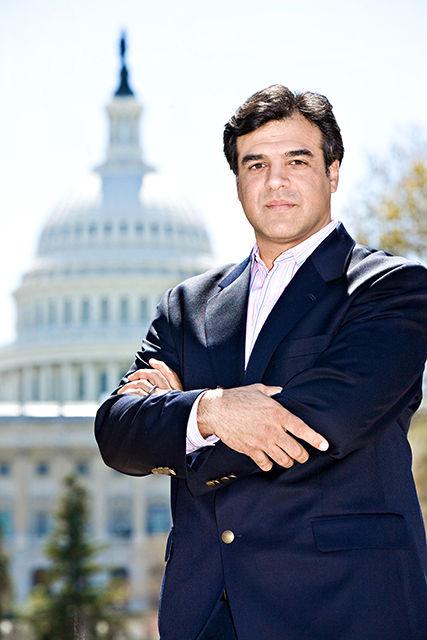 PEN Center USA will award John Kiriakou, an associate fellow at the Institute for Policy Studies and former CIA counterterrorism officer, with the First Amendment Award." />
PEN Center USA will award John Kiriakou, an associate fellow at the Institute for Policy Studies and former CIA counterterrorism officer, with the First Amendment Award." />
Contributed by John Kiriakou
PEN Center USA will award John Kiriakou, an associate fellow at the Institute for Policy Studies and former CIA counterterrorism officer, with the First Amendment Award.
In the eyes of former CIA counterterrorism officer John Kiriakou, there is no grey area when it comes to acts of torture. Kiriakou, an associate fellow at the Institute for Policy Studies, revealed in 2007 that the CIA was torturing prisoners under official U.S. government policy, approved by the president.
Kiriakou, who calls himself a whistleblower, is the only CIA official to suffer legal consequences after refusing to participate in acts of torture. He served nearly two years in prison and was released from house arrest in May 2015 as part of a plea bargain.
On Nov. 16, the PEN Center USA will award him with the First Amendment Award, one of the four biggest literary awards in the country.
“This was a real honor for me,” Kiriakou said. “It recognized the writing that I did from prison — about prison reform and prison conditions — and also the fact that I refused to subpoena journalists in order to save myself and my case.”
After he led the capture of Abu Zubaydah, an assumed member of al-Qaeda at the time of his capture, Kiriakou was asked if he wanted to be certified in the use of enhanced interrogation techniques. Before giving an answer, he went to talk to a senior officer he’d known for many years on whether or not he should be informed.
“He told me, ‘First let’s call it what it is: it’s torture. They can call it whatever they want, but it’s still torture,’” Kiriakou said. “He then told me that somebody’s going to go too far sooner or later and that’s going to involve several investigations, and somebody’s going to go to prison for it.”
But still, even after declining the invitation, Kiriakou knew what the practices inflicted on Abu Zubaydah were: waterboarding, sleep deprivation, isolation, beatings.
“The CIA field teaches you that everything is a shade of grey and I think that some issues are black and white, like torture,” Kiriakou said. “The United States is supposed to be this beacon of human rights and liberty and if we’re torturing people, we can’t be that beacon.”
Kiriakou said that to make sure he was consistent in what he was saying and his beliefs, he had to embrace the decision he made to reveal the CIA’s involvement in torture, even if that meant people were going to walk away from him.
During his time in prison, Kiriakou wrote a book called “Letters from Loretto,” based on a compilation of blogs that he wrote looking at the prison system in the United States. He also wrote “Doing Time Like a Spy: How the CIA taught me to Survive and Thrive in Prison.”
Kiriakou is on tour with North Carolina Stop Torture Now, a grassroots coalition, to speak out about torture and ethics in intelligence operations.
NC Stop Torture Now started in 2005 when the organization learned that the CIA was using North Carolina airport hangers to transport prisoners to places where they could be interrogated. Some of the airports used are in Smithfield, North Carolina, and Kinston, North Carolina. The CIA was using an aviation company called Aero Contractors to transport the prisoners they’d captured to Black Sites, secret detention centers in other countries such as Thailand, Romania, Lithuania, Poland, Afghanistan and Cuba.
“North Carolina taxpayers, without our knowledge or consent are financing these missions, providing infrastructure to the CIA,” said Christina Cowger, coordinator of NC Stop Torture Now. “The CIA were using our airports as a staging ground for aviation missions that were integral to the secret detention and torture.”
Upon discovering that information, the individuals at NC Stop Torture Now began protesting and meeting with government officials and calling for investigations and a ban on torture-related missions coming out of the airports.
“Our governors and attorney generals have essentially turned a blind eye,” Cowger said. “I think we, as North Carolinians and Americans, should be asking what kind of society we want to live in. Do we want to live in a country where rape and murder and genocide and torture that have always been wrong to be tolerated? Even if people who can ignore and forget the survivors of CIA torture, it’s still a question of what kind of country do we want to live in? What John did, I think we should all be grateful for him to take that stand at quite a bit of personal cost.”
Thursday, Oct. 29, 2015
1:10 to 2:10 p.m.: NCSU Peace & Justice Forum, Talley Student Union, room 3285
7 p.m.: “The American Legacy of Torture,” Park Shops 210